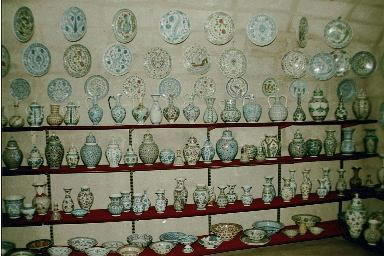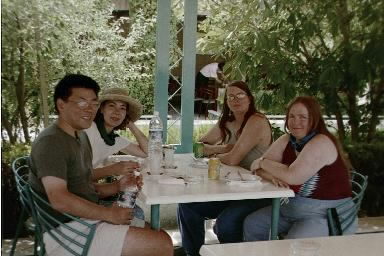

Before heading off to our flight back to England, the tour group fit in one last opportunity to separate us from our money - a visit to the local ceramics factory. We got to tour the facility, marvel at the huge kilns, and watch the workers throwing pots and painting designs (and of course the usual "embarrass the tourist volunteer by having them try to work the potters' wheel" schtick). Then they turned us loose in the showrooms, which were nothing short of amazing. Room after room after room (there must have been at least ten of them) all with absolutely lovely things all over the walls. Here's some pictures of a few of the walls:


Unfortunately my taste was a little too good - the stuff I really liked was all the most expensive stuff...
Wallets significantly lightened, we hopped on the bus for our drive to Ankara. The observant among you may notice that's not the same city we flew into - for some reason, we flew into Kayseri, but were flying out of Ankara (several hours' drive farther away from Avanos). Well, at least it was an opportunity to see a bit more of the countryside.
The first highway we took followed more of the old Silk Road (west this time rather than east). There's still the occasional karavanserai (twelfth-century travelers' hostel) along the road, left over from when the Turkish tribes wanted to increase silk and spice commerce by providing a safe place to stay on the road (and thereby increase their wealth and influence).
The land around here is planted mostly in wheat and sunflowers - fields and fields of sunflowers in bloom, and great big piles of seed heads drying in the hot sun.
We stopped for a yummy lunch at a truck stop:

We turned north towards Ankara, skirting along the edge of Turkey's largest lake, a salt lake called, with an almost American lack of imagination, the Salt Lake. Along the drive Mehmet kept us (well, some of us, at least) awake by expounding upon the vagaries of Turkish politics. It started with The Great Armenian Apology - telling of that dark part of Turkish history from the Turkish point of view. Somehow, the knowledge that most of the Armenians died from exposure or starvation rather than being killed outright probably doesn't make their relatives feel much better. (Stalin did similar things to my relatives in Russia - and it doesn't feel any less like genocide to me...) Anyway, apparently the liberal-Turk way of looking at this is that the Turks did some very regrettable things back then, a lot of Armenians died, and it's rather silly for the government to keep pretending it didn't happen.
Then he attempted to explain the intricacies of the Turkish electoral process. Turkey has large numbers of political parties - so many that every government formed has to be a coalition. Theoretically, elections are held every five years, but the coalitions always fall apart before then, so in reality elections are held more like every eighteen months. In an effort to control the huge numbers of parties, the government came up with a very odd solution - a party can't participate in the government unless it gets more than 10% of the votes nationwide. (notice that this effectively eliminates any power for regional parties, like, say, the Kurds) The *really* wacky thing about it, though, is what happens if you vote for a party that gets less than 10% - those votes are redistributed to the top vote-getters. So, for example, I could vote for Jerry Brown, and if he didn't get 10% of the vote, my vote could end up going to Pat Buchanan instead. Tres bizarre.
Eventually we started climbing up into the mountains (and there were times I thought our bus wasn't quite going to make it), and the vegetation started changing from scrub brush to pine trees (actually, Turkey used to have lots of forests, but one of the disadvantages of over 4000 years of continuous habitation is that eventually most of your forests get chopped down. The government has started some reforestation projects, but it'll take many years for those to have any noticeable effect). Ankara is situated up in the mountains, and, like many seats of government, is a modern, drab, dull place. We immediately dubbed it "the Sacramento of Turkey." Once we got to the airport, we discovered we had only a little time to check in our bags before our flight was supposed to leave, and all hell broke loose with two busloads of tourists all trying to make it past the security checks at once and the hapless tour guides trying to get two buses' worth of boarding passes and check in two buses' worth of baggage. As it turned out, we didn't need to hurry quite so much, since we were pretty much the entire complement of passengers on the flight, so it's not like they were going to take off without us. Eventually they got us all straightened out and we were off to Istanbul.
Thankfully we got there in plenty of time to catch our flight back to Heathrow (even had time to sit and sweat in the departure lounge for a while). Soon we were on the more comfy (if not safer) Airbus headed for England, and one last chance for a Refreshing Towel. (theTurkish Airlines equivalent of a Wet-Nap is a Refreshing Towel - I amassed quite a collection of them on our numerous flights around Turkey)
By the time we got to Heathrow it was fairly late at night - luckily Bonnie had thought of that and booked us into a hotel near the airport. The Novotel (as you might expect from the name) was everything the Grosvenor Court was not - huge, modern, and equipped with wide hallways and no stairs. By this time I was perfectly happy to trade a little quaintness for the ability to roll my suitcases into my room unimpeded. Although we were supposed to have a non-smoking room, when we got inside the room absolutely reeked of cigarettes - as if the entire French population of our hotel in Avanos had crammed in there for a ciggy break. Complaints to the management did no good, as there weren't any other non-smoking rooms available, so we opened the window to air things out a bit and hoped that not too much rain would get in.
Last updated 1/3/2000 by Jean Richter, richter@eecs.Berkeley.EDU